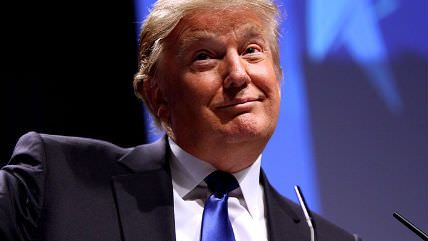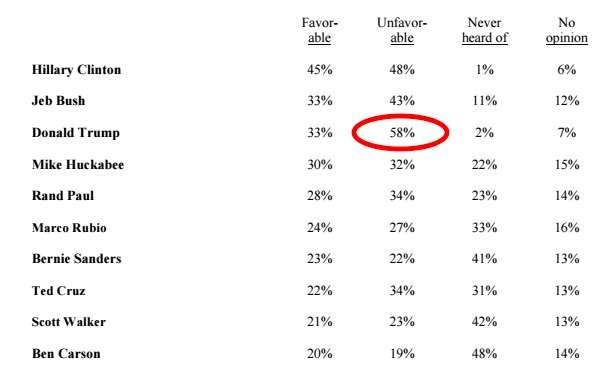Donald Trump Is Leading in the Polls. He's Still Not Going to Win the Nomination.
Primary polling taken this far out tells us virtually nothing about who will ultimately triumph.


If you're paying attention at all, you've probably heard that Donald Trump is leading the field for the Republican presidential nomination. And indeed, a new poll from CNN and ORC puts him in first place, capturing 19 percent of the vote. (Former Florida Gov. Jeb Bush is at 15 percent and Wisconsin Gov. Scott Walker is at 10 percent; everyone else is in the single digits.) Other recent polls have had Trump ahead as well.
A word of caution, however, to anyone who might be tempted to conclude that he could actually receive his party's nomination: Horserace surveys conducted six months before the voting even starts tell us virtually nothing about who will ultimately win.
Trump is really hoping people will take these recent data seriously. Here's why you should be ignoring them instead.
1. The vast majority of people haven't decided who they're voting for yet. As I explained in a piece for Reason's July issue, polls taken this far out are subject to dramatic fluctuations. And if you don't believe me, take a look at this chart from HuffPost Pollster.com portraying national polling averages during the 2012 primary race:
The truth is that voters in July 2015 haven't yet taken the time to learn about and weigh the relative merits of the different candidates hoping to be elected president in November 2016. Some 42 percent of respondents in that CNN/ORC poll cited earlier had never even heard of Scott Walker. A third was not familiar with Marco Rubio.
You know who they had heard of? Donald Trump. And at this early stage, name recognition alone is enough to make a difference. From my print piece:
"When you have a lot of candidates who are poorly known, there are events that can happen that might temporarily alter the snap preferences people give when interviewed," [polling expert] Mark Blumenthal explains. "A lot of the people who will vote in the primaries haven't thought about this yet [and] don't know the names of all the candidates. Yet when intercepted in the midst of doing whatever they're doing and read a list of names, they will try to pick one…If there was a lot of news this week about a candidate jumping into the race, some people are going to pick that name just because they heard it recently."
A reality TV star everyone has heard of but hardly anyone likes is far more likely to be 2016's version of Herman Cain than its version of Mitt Romney. And make no mistake about it—despite being in first place in that poll, Trump's unfavorables were simultaneously off the charts.

2. National polls badly oversimplify the American electoral process. Most of the surveys being reported on right now are national surveys. That means a person in South Carolina, whose primary contest is slated for February 20, is just as likely to be included in the poll as someone from New Mexico, who won't get to vote until June. But those two responses are not created equal. From my piece again:
Because states don't all vote on the same day, the outcome of one election invariably alters expectations and thus choices in subsequent surveys. "You could measure voter preferences right now in Texas all you want," says Mark Blumenthal, a former pollster who now runs the HuffPost Pollster site, "but I guarantee you they're going to be different after Iowa, New Hampshire, and South Carolina than they are right now…"
Giuliani famously discovered this in 2008, when his strategy of ignoring the early primary states and focusing on Florida and the Super Tuesday elections ended in spectacular failure. McCain and Romney, his top opponents, were able to pick up momentum with wins in Nevada, South Carolina, and Michigan. Meanwhile, Giuliani could not recover from the perception that his campaign had collapsed even before voters in the Sunshine State, where he'd concentrated his resources, went to the polls.
3. Iowa doesn't matter as much as Iowans would like you to believe. What do Rick Santorum and Mike Huckabee have in common? You guessed it—they were the last two winners of the Iowa GOP caucus. Neither, you may recall, went on to win his party's nomination.
Iowans also had a track record of flirting with losing candidates during their quadrennial "straw polls," which were a beloved tradition until they were canceled this year for causing too much of a distraction. Held six times going back to 1979, the winner of the straw poll went on to win the nomination only twice. The 2011 victor? Now-retired Minnesota Rep. Michele Bachmann.
All of which is a long way of saying that Trump's performance in state-specific Iowa polls probably doesn't mean much.
4. Shooting from the hip will only get you so far. One of Trump's selling points is that he says what he thinks—no matter how offensive. That can be entertaining and even refreshing for a while. But there is a limit to the number of times voters will abide a candidate for the highest office in the land putting his foot in his mouth. Earlier this year, neurosurgeon and presidential hopeful Ben Carson was dinged for saying homosexuality is a choice. On July 18, Trump similarly caused an uproar when he suggested that Sen. John McCain (R–Ariz.) is only considered a "war hero" because he was captured during Vietnam.
Not all gaffes matter in politics. But there's some evidence this one will. An NBC/Marist poll of New Hampshire voters was in the middle of being conducted when he made the comment about McCain. In interviews conducted beforehand, 26 percent of voters said they were supporting Trump. In interviews conducted after, that number plummeted to 14 percent. A drop that large in a matter of days without any changes in polling methodology is never a good sign.
And with six months until the first primary contests and a year until the Republican convention, the real issue for Trump isn't the dumb stuff he's already said—it's all the dumb stuff he's yet to say that we can all be sure is coming.


Show Comments (185)